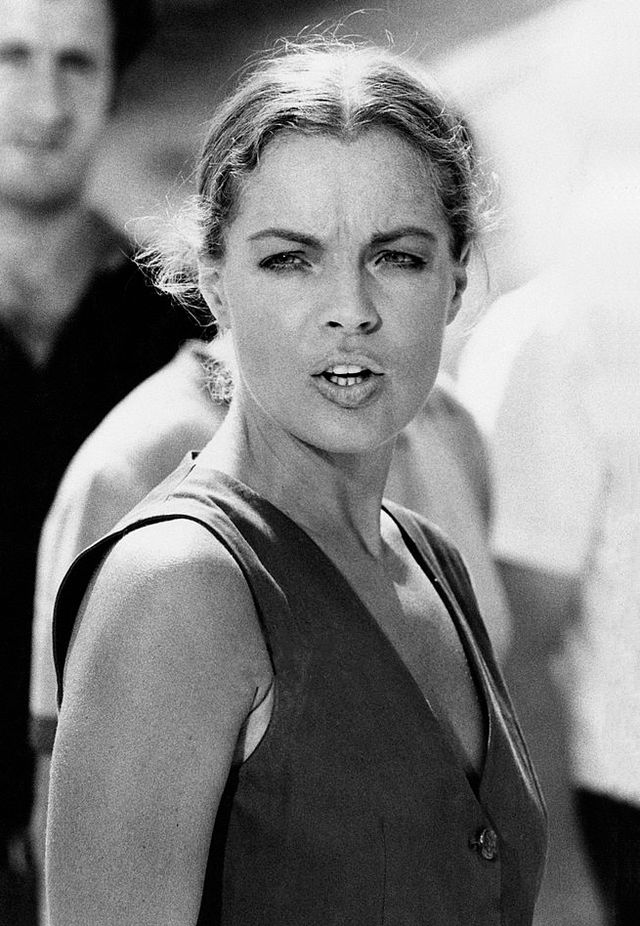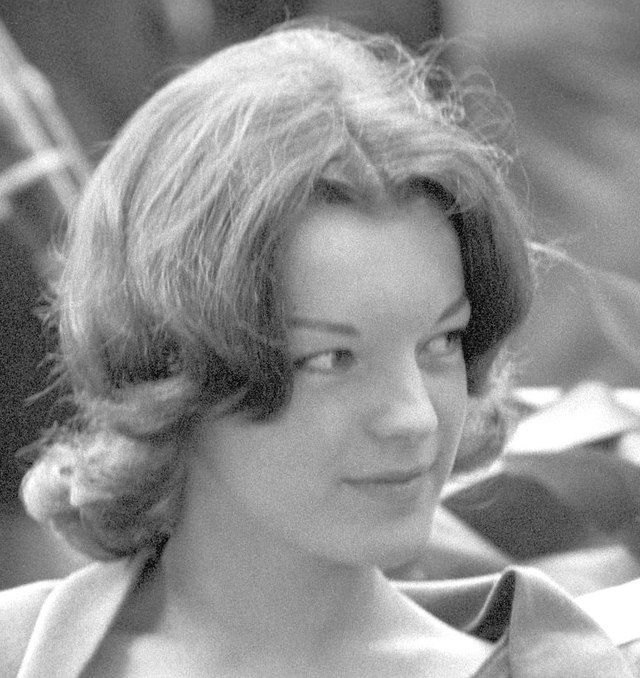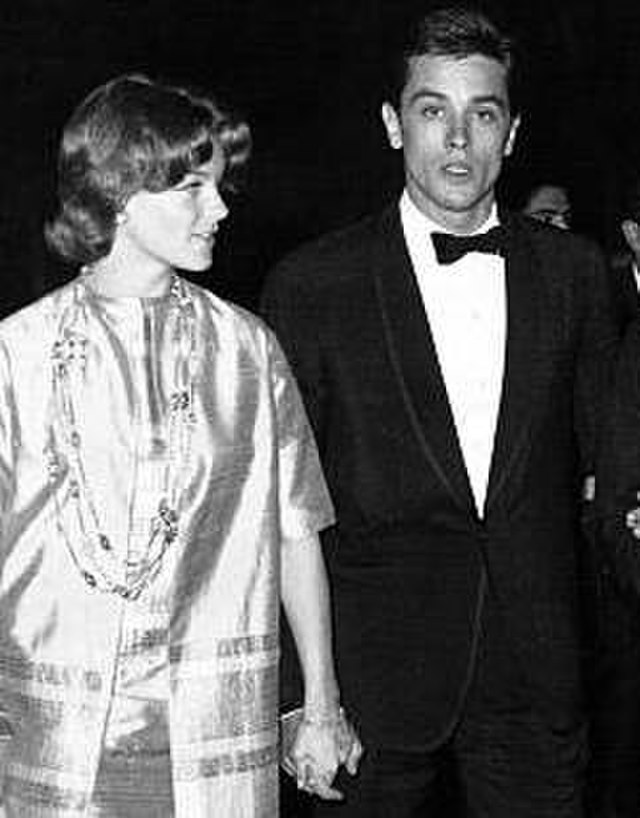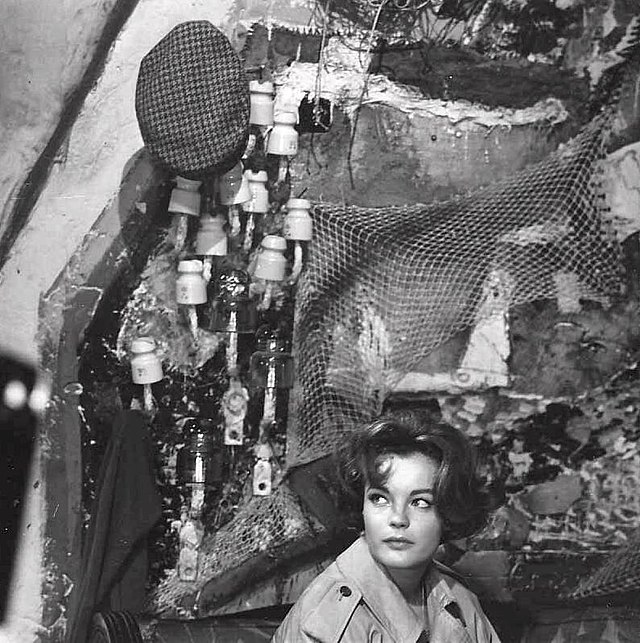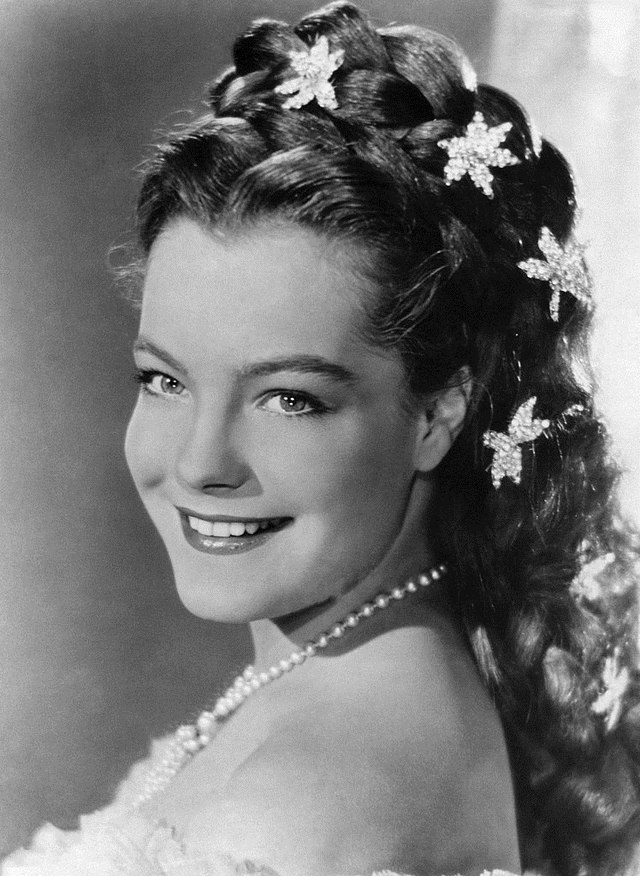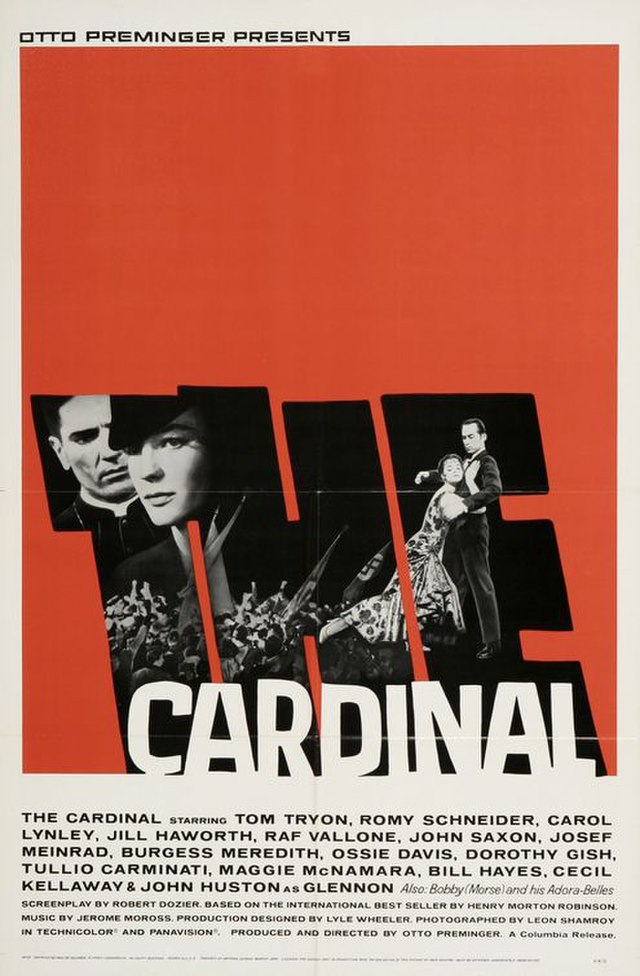Romy Schneider
back| Full Name | Rosemarie Magdalena Albach-Retty |
| Stage Name | Romy Schneider |
| Born | September 23, 1938 |
| Birthplace | Vienna, Austria |
| Died | May 29, 1982 (aged 43) |
| Buried | Boissy-sans-Avoir Cemetery, Yvelines, France |
| Married to | Harry Meyen (1966–1975) - Daniel Biasini (1975–1981) |
| Children | David-Christopher Meyen (1966–1981) - Sarah Magdalena Biasini (b. 1977) |
| Notable films | Sissi Trilogy (1955 - 1957) - Christine (1958) - The Trial (1962) - La Piscine (1969) - Les Choses de la Vie (1970) - L'Important s'est d'aimer (1975) - The Innocent (1976) |
Romy Schneider
The Eternal Empress
Romy Schneider was a celebrated Austrian-French actress. She rose to fame in the 1950s with the Sissi trilogy, where she portrayed Empress Elisabeth of Austria.
Seeking more challenging roles, she moved to France, reinventing herself with emotionally complex performances in films like The Swimming Pool (1969) and The Things of Life (1970).
Her personal life, marked by tragedy—including the death of her son—deeply influenced her later roles. She passed away at 43 in Paris in 1982, leaving a lasting legacy as one of Europe’s most beloved and talented actresses, admired for her emotional depth and authenticity.
Related
Romy Schneider (1938 – 1982)
Biography and Movie Career
Early Life (1938–1953)
Romy Schneider was born Rosemarie Magdalena Albach-Retty on September 23, 1938, in Vienna, Austria, into a prominent acting family. Her father, Wolf Albach-Retty, was an Austrian actor, and her mother, Magda Schneider, was a well-known German actress. From a young age, Romy was immersed in the world of cinema and theater. She grew up mostly in Germany, where her parents’ celebrity status and frequent public appearances shaped her early understanding of life in the limelight. However, her parents divorced when she was still young, and Romy stayed with her mother.
Though initially drawn to a more conventional life and considering other careers, Romy’s fate was sealed when she appeared alongside her mother in the 1953 film When the White Lilacs Bloom Again (Wenn der weiße Flieder wieder blüht) at the age of 15. This would be the beginning of her illustrious film career.
The "Sissi" Phenomenon and Path to Success (1954–1960)
Romy Schneider’s rise to international fame began with her iconic role as Empress Elisabeth of Austria in the Sissi trilogy (1955–1957). These films, which romanticized the life of the Austrian Empress, made Romy a beloved star in Europe, especially in German-speaking countries. The Sissi series portrayed her as a sweet, innocent, and glamorous royal, and Romy found herself typecast in roles that emphasized this image.
Despite the fame and success Sissi brought her, Romy grew to resent the character, feeling confined by the role’s lack of depth. Determined to move beyond these films and avoid being pigeonholed, she sought out more challenging roles, and in 1958, Romy starred in Christine, where she met French actor Alain Delon. The two actors became romantically involved, and Romy soon moved to Paris.
New Horizons in France and International Stardom (1960–1970)
In Paris, Romy Schneider reinvented herself both professionally and personally. Her relationship with Alain Delon brought her into the circle of French intellectuals and filmmakers. Under the mentorship of directors like Luchino Visconti, Romy began to transition to more sophisticated and challenging roles that highlighted her emotional depth and dramatic ability.
One of her breakthrough roles in this new phase of her career came in 1962 when she starred in Orson Welles' The Trial, alongside Anthony Perkins. The film showcased her ability to play more complex characters, and Romy found her footing as a serious actress.
She worked on a number of notable French and international films during this period, such as The Swimming Pool (La Piscine, 1969), which paired her once again with Alain Delon, and The Things of Life (Les Choses de la Vie, 1970), directed by Claude Sautet. These films demonstrated her growing maturity as an actress, and she was now recognized as one of Europe’s finest performers.
Personal Life: Marriages, Children, and Struggles (1966–1982)
Romy's personal life was tumultuous, marked by great loves, heartbreak, and tragedy. Her relationship with Alain Delon ended in 1964, when Delon left her abruptly for another woman. Though heartbroken, Romy channeled her emotional pain into her work, which continued to thrive.
In 1966, she married German director Harry Meyen, with whom she had her first child, David-Christopher, in 1966. However, the marriage was strained, partly due to Meyen’s emotional instability. They divorced in 1975, and not long after, Meyen tragically took his own life.
In 1975, Romy married her second husband, Daniel Biasini, her private secretary. They had a daughter, Sarah Magdalena Biasini, in 1977. Romy’s second marriage also ended in divorce in 1981.
Passions and Struggles
Romy Schneider was known for her passion for acting and the emotional intensity she brought to her roles. She was deeply committed to her craft and constantly sought roles that would allow her to express the depth of her emotional range. Off-screen, however, her life was often marked by sorrow. Her personal struggles — including her difficult relationships, the pressures of fame, and a long-standing battle with depression — affected her greatly.
She also had a difficult relationship with alcohol and suffered health problems, including kidney ailments that required surgery. Despite her struggles, Romy continued to deliver remarkable performances, especially in films like The Old Gun (Le Vieux Fusil, 1975) and Death Watch (1980), which became iconic representations of her talent.
Tragedy and Death (1981–1982)
Romy Schneider's life took a tragic turn in 1981, when her son, David-Christopher, died in a terrible accident at the age of 14. He was attempting to climb a fence and was fatally injured when the gate’s spikes pierced his body. Romy was devastated by his death, and it sent her into a deep depression. She became increasingly withdrawn and struggled to cope with the overwhelming grief.
Less than a year after her son's death, on May 29, 1982, Romy Schneider was found dead in her Paris apartment. Though initial reports speculated that she had taken her own life, an autopsy later revealed that she had died of cardiac arrest, most likely caused by a combination of her grief, long-term alcohol use, and medication.
She was 43 years old.
Romy Schneider was buried in Boissy-sans-Avoir Cemetery in France, next to her beloved son David.
Legacy
Romy Schneider left behind a legacy as one of Europe’s most talented and beloved actresses. From her early stardom in the Sissi films to her powerful, nuanced performances in French cinema, she was an actress who continually sought to redefine herself. Despite the many personal hardships she endured, Romy remains an icon of European cinema, remembered for her beauty, grace, and remarkable talent. Her body of work continues to be celebrated, and she is regarded as one of the greatest actresses of her generation.
Final Days of an Icon: Romy Schneider Documentary:
Alain Delon and Romy Schneider
The relationship between Alain Delon and Romy Schneider was one of passion, intensity, and enduring emotional connection. It was a love story that captivated the public, but it was also marked by heartbreak and complexity.
How They Met:
Romy Schneider and Alain Delon first met in 1958 on the set of Christine, where they played lovers. At the time, Romy was already a well-known star in Europe, particularly for her role as Empress Elisabeth in the Sissi trilogy. Delon, on the other hand, was a rising French actor. Their on-screen chemistry quickly translated into a real-life romance, and soon Romy left her established career in Germany and Austria to be with Delon in Paris. She was 20 years old and madly in love, willing to start a new life in France for him.
Their Passionate, Tumultuous Love:
Their relationship was passionate, intense, and full of contradictions. Romy, who had lived a somewhat sheltered life, was introduced to the vibrant, bohemian lifestyle of Paris, where Delon was part of a circle of intellectuals, artists, and filmmakers. Their love was often described as fiery, with both experiencing intense highs and lows.
Although they were deeply in love, Delon was known for his restless and independent nature. Romy, who had left her country and career behind for him, sometimes struggled with this dynamic. Despite their passionate bond, Delon’s ambition and flirtations with other women caused tension.
Breakup:
In 1963, after five years together, Alain Delon abruptly ended their relationship. He left Romy a letter, along with a bouquet of roses, explaining that their relationship was over. The breakup devastated Romy, and she returned to Germany for a time, heartbroken. Delon had moved on to another woman, Nathalie Barthélémy, who would become his wife.
Post-Breakup Relationship:
Despite the end of their romantic relationship, Romy Schneider and Alain Delon maintained a deep and enduring bond. Delon reportedly felt guilt over the way he had ended things and made efforts to stay in Romy’s life. In interviews, he often spoke fondly of her and acknowledged that their love had never truly disappeared.
They remained close friends, and Delon helped Romy with her career in France, introducing her to influential filmmakers like Luchino Visconti. Their on-screen reunion in the 1969 film La Piscine rekindled public interest in their relationship. In this film, their off-screen history added an intense layer to their performances, portraying a couple with unresolved tensions and buried emotions.
Romy’s Impact on Delon:
Alain Delon has consistently referred to Romy Schneider as one of the great loves of his life. Even after their relationship ended, he spoke of her with deep admiration and respect. In various interviews throughout his life, Delon admitted to never fully moving on from Romy, and he regretted the way their relationship had ended.
Delon After Romy's Death:
When Romy Schneider died in 1982, Delon was devastated. He played a significant role in organizing her funeral, making sure she was buried alongside her son, David, who had died tragically the year before. Delon was one of the pallbearers at her funeral and was said to be emotionally distraught by her passing. He later stated, "No one will ever understand how much I loved her," underscoring the deep emotional connection they shared, even after many years apart.
A Love That Endured:
The relationship between Romy Schneider and Alain Delon remains one of the most iconic love stories in European cinema. Although their romance was short-lived, their bond transcended time, and they maintained a deep friendship until Romy’s death. Delon often reminisced about their love, expressing that Romy had a lasting impact on his life, calling her the "love of his life."
Emotional Acting by Romy Schneider
Romy Schneider's acting style was marked by a unique blend of emotional depth, grace, and vulnerability, which evolved significantly throughout her career. From her early roles as a youthful ingénue to her later portrayals of complex, emotionally scarred women, Schneider's ability to express intense inner emotions made her a standout performer in European cinema.
Early Career: The Innocent and Romantic Persona
In the early stages of her career, particularly in the Sissi trilogy, Romy was often cast as the innocent, graceful, and almost fairy-tale-like young woman. She embodied sweetness, charm, and beauty, with a natural elegance that captivated audiences. Her movements were delicate, her expressions soft and dreamy, and her speech carried an ethereal lightness. In these roles, Romy excelled at conveying an idealized, almost pure form of femininity that matched the romantic and idyllic nature of the films.
Despite being adored for these performances, Schneider herself felt constrained by this persona, yearning to break free from the "perfect" image. Her early acting was more restrained, serving the narrative rather than exploring the psychological depths of her characters.
Transition to Complex Characters: The French Influence
Romy Schneider's acting style began to shift dramatically when she moved to France and started working with more auteur-driven directors like Luchino Visconti, Claude Sautet, and Orson Welles. Under their influence, Romy’s performances grew in complexity, embracing a naturalism that allowed her to explore emotional depth, human fragility, and inner turmoil.
In her French films, Romy demonstrated a remarkable ability to convey a wide range of emotions, often with minimal dialogue. Her face became a canvas for subtle shifts in feeling—pain, longing, joy, and despair—all conveyed through her expressive eyes and nuanced facial expressions. She mastered the art of understatement, creating characters whose inner lives were just beneath the surface, accessible to audiences without being overtly dramatized.
Emotional Intensity and Vulnerability
One of Romy’s greatest strengths as an actress was her capacity for emotional intensity. In films like The Swimming Pool (La Piscine) and The Things of Life (Les Choses de la Vie), she portrayed women on the edge, characters who were struggling with deep, often unspoken, emotional conflicts. She had the ability to make even the most ordinary moments charged with emotion, and her silence in many scenes spoke louder than words.
Her vulnerability was particularly striking. Romy had an exceptional gift for conveying characters who were wounded or broken but continued to carry on with dignity and strength. This was evident in films like L'important c'est d'aimer (That Most Important Thing: Love), where her portrayal of a fragile, emotionally scarred actress earned her critical acclaim. Schneider was able to reflect the internal struggles of her characters in such a personal way that audiences felt a deep empathy for the pain and suffering they endured.
Physical Presence and Body Language
Romy’s physicality also played a crucial role in her performances. Unlike many actors who relied heavily on dramatic gestures or exaggerated movements, Romy’s approach was more subtle. Her body language was fluid, and her gestures often understated, which allowed her to create characters who felt authentic and grounded in reality. Whether she was playing a royal figure in a historical drama or a modern woman facing personal crises, her presence on screen was magnetic and compelling.
Her use of stillness was another remarkable aspect of her style. Romy could hold a scene with just a glance or a slight movement, communicating volumes through her posture or the way she held her hands. This stillness added an introspective quality to her performances, making the audience feel as though they were witnessing something deeply private and personal.
Darkness and Melancholy in Later Roles
As Romy aged, her acting style became darker, more melancholic, and even more introspective. The personal tragedies in her life, particularly the death of her son and her struggles with depression, seemed to inform her later roles, where she often played women dealing with immense loss or existential despair. Her performances in films like The Old Gun (Le Vieux Fusil) and Death Watch reflected a woman who had known deep personal sorrow and was able to channel that grief into her characters.
She excelled at playing characters whose lives were marked by trauma, women who had been emotionally scarred by love, loss, or societal pressures. In these roles, Romy’s vulnerability was matched by an underlying strength, making her characters feel both fragile and resilient at the same time. She didn’t shy away from difficult emotions or complex moral questions, and her later work often explored themes of death, identity, and the human condition with remarkable honesty.
Timeless Elegance and Realism
Throughout her career, Romy retained a sense of timeless elegance, but as her acting style matured, she embraced a realism that allowed her characters to feel deeply human. She had an ability to dissolve into her roles, disappearing into the character rather than allowing her star persona to dominate. This authenticity is one of the reasons her performances resonate so strongly even today.
Romy Schneider’s acting style was ultimately a balance between emotional transparency and restraint. She could communicate the most profound depths of human experience without excess, making her performances nuanced and deeply affecting. Her ability to convey the inner lives of her characters with such clarity and empathy solidified her as one of the most talented and beloved actresses of her generation.
Quotes by Romy Schneider:
On Life and Her Career:
- "I wish I could believe in reincarnation. But if reincarnation exists, I'd like to come back as a squirrel. I know it’s weird, but I see them jumping around, full of energy, and I think, 'What a beautiful life!'"
This quote reveals Romy’s yearning for a simpler, carefree existence, away from the pressures of fame and her personal hardships.
- "I am nothing in my life. My only reality is on the screen."
Romy often expressed a sense of disconnection between her personal life and her work. This quote highlights how she found a deeper connection and sense of identity through acting.
- "You must not quote me in this way. You must quote me as I say it."
A reflection of her desire to be understood as she was, without embellishment or distortion, showing how she valued authenticity.
- "When I have finally acquired enough money for a good old-age pension, I will retire to a little house on a lake and sell flowers on the roadside. It will be paradise."
This quote captures Romy’s longing for peace and simplicity, contrasting sharply with the glamorous yet tumultuous life she led.
On Love and Relationships:
- "Love for me is a gift of fate, and I have lived for love. But love, too, fades and leaves wounds. Wounds that do not heal, only scar."
Romy experienced great love but also deep heartbreak, which influenced her perspective on relationships and life. This quote reflects the emotional scars that shaped her later years.
- "Memories are the best things we can ever have, and the worst thing that can ever happen to us."
Her poignant reflections on love and loss speak to the power and pain of memory, particularly in light of her personal tragedies.
On Acting and Her Public Image:
- "I’m an actress, not a star. Stars are people who live in Hollywood and have heart-shaped swimming pools."
Romy made it clear that she did not see herself as a typical celebrity, choosing instead to focus on the craft of acting rather than the glamorous trappings of stardom.
- "You can’t work in France or Germany without being involved in politics, without making a statement. Everything is political."
This quote underscores Romy's belief in the role of cinema and art as a reflection of societal issues, particularly in the politically charged context of 20th-century Europe.
- "You can never forget that in many ways the camera is a mirror, reflecting not only the character you’re playing but your soul as well."
Romy believed in the deep connection between the actor and their role, seeing the camera as a tool that reveals both the character and the actor’s inner life.
What Others said about Romy Schneider
Romy Schneider was adored, admired, and respected by her peers, critics, and filmmakers. Many people who worked with or knew her spoke about her talent, charisma, and personal struggles. Here are some notable reflections on Romy Schneider from those who knew or admired her:
Alain Delon (Actor, former partner)
- "She was the love of my life."
Alain Delon and Romy Schneider shared a passionate, albeit tumultuous, relationship. Delon often referred to Romy as the love of his life, despite their eventual separation. Even after their breakup, they remained close friends, and Delon was one of the few people Romy stayed in touch with until her death.
- "No one will ever understand how much I loved her."
Delon expressed deep emotions about Romy Schneider throughout his life, hinting at the complexity of their relationship and the impact she had on him.
- "Romy was sunshine and sadness in the same breath."
Delon encapsulated her dual nature, highlighting her radiant public persona and her personal sorrows.
Claude Sautet (Director)
- "Romy was the actress who was always closest to my heart."
French director Claude Sautet had a special bond with Romy Schneider, having directed her in several films (The Things of Life, César and Rosalie, A Simple Story). He admired her emotional depth and ability to bring authenticity to every role.
- "She gave her soul in every scene. You could see her pain and joy, her whole life, in her eyes."
Sautet emphasized the intensity and rawness of Romy’s performances, as she often drew on her personal experiences to give depth to her characters.
Luchino Visconti (Director)
- "Romy has this extraordinary ability to transform herself on screen. She is an actress who surrenders completely to her role."
Luchino Visconti, who directed Romy in Boccaccio '70 and other projects, appreciated her willingness to immerse herself fully into the characters she portrayed, leaving behind any vanity.
- "She has an instinctive intelligence as an actress. She doesn’t act, she lives the part."
Visconti admired Romy’s natural talent and emotional intelligence, remarking on how she didn’t just portray roles but embodied them fully.
Michel Piccoli (Actor)
- "With Romy, every scene felt real. She had this incredible presence that made every moment matter."
Michel Piccoli, who co-starred with Romy in The Things of Life, reflected on her ability to make even the simplest moments feel profound and authentic.
Jean-Claude Brialy (Actor)
- "Romy had the ability to make everyone around her feel special, but you could sense the sadness she carried inside."
Jean-Claude Brialy, who worked with Romy in various films, recognized her personal struggles despite her vibrant public persona. He spoke of her kindness and vulnerability.
Marlene Dietrich (Actress)
- "Romy was a rare beauty, but more than that, she was real. She had a kind of depth that you don’t see often in the film industry."
Marlene Dietrich, a legendary actress, saw Romy Schneider not just as a beautiful star but as an actress with significant emotional depth and authenticity.
David Hemmings (Actor)
- "Romy had a combination of mystery, vulnerability, and strength. You never knew what was behind her eyes, but you couldn’t stop watching."
David Hemmings, Romy’s co-star in The Swimming Pool, was struck by her enigmatic presence on screen and her ability to convey strength and fragility at once.
Catherine Deneuve (Actress)
- "Romy was someone who lived in extremes—she could be incredibly joyful and then sink into sadness. It was part of what made her such a compelling actress."
French icon Catherine Deneuve remarked on Romy’s emotional range, acknowledging that her highs and lows gave her an extraordinary depth as a performer.
Jean Renoir (Director)
- "Her performances were always deeply personal. She brought her life, her joys, and her pains into her roles in a way that was truly remarkable."
Renowned filmmaker Jean Renoir praised Romy Schneider’s ability to tap into her own life to create vivid, compelling characters.
Awards and Recognition
Romy Schneider received numerous awards and accolades throughout her career, particularly in France, where she became one of the most revered actresses of her time. Here's a complete overview of the key awards and recognitions she garnered:
César Awards (France's National Film Awards)
- 1975: Best Actress for L'important c'est d'aimer (That Most Important Thing: Love)
Romy Schneider won her first César Award for her powerful portrayal of Nadine, a struggling actress in this emotionally charged drama. - 1979: Best Actress for Une histoire simple (A Simple Story)
Her second César Award came for her role as Marie, a woman navigating personal and emotional crises in this intimate and reflective drama.
Bambi Awards (Germany)
- 1957: Best Actress – National for the Sissi series
Romy received the Bambi Award in recognition of her role as Empress Elisabeth in the Sissi films, which catapulted her to fame. - 1958: Best Actress – National for Monpti
This award acknowledged her continued popularity and success in German-speaking cinema. - 1982: Honorary Bambi (posthumous)
Romy was honored with a posthumous Bambi Award in recognition of her enduring legacy in the film industry.
David di Donatello Awards (Italy)
- 1976: Best Foreign Actress for L'important c'est d'aimer
Romy was recognized by Italy's prestigious David di Donatello Awards for her outstanding performance in L'important c'est d'aimer.
Deutscher Filmpreis (German Film Awards)
- 1977: Best Actress for Gruppenbild mit Dame (Group Portrait with a Lady)
This award honored Romy for her nuanced performance in this film adaptation of Heinrich Böll's novel, where she plays a woman reflecting on her life during and after World War II.
Premio San Sebastián (San Sebastián International Film Festival)
- 1963: Best Actress for The Trial (Le Procès)
Romy was awarded for her role in Orson Welles' adaptation of Franz Kafka's novel, where she played Leni, a mysterious and complex character.
Romy Schneider Prize (France)
- 1976: Romy Schneider Prize
This special French film industry award was established in her honor to recognize the most promising young actresses. Romy was the first recipient of this award.
Berlin International Film Festival
- 1983: Posthumous Honor
After her death, the Berlin International Film Festival held a tribute to Romy Schneider, celebrating her contribution to world cinema and her indelible mark on European film.
Star on the Boulevard of the Stars (Berlin)
- 2010: Star in Berlin
Romy Schneider was posthumously honored with a star on the Boulevard of the Stars in Berlin, Germany, recognizing her as one of the most important figures in German and European cinema.
Other Honors
- Romy Schneider Museum (Austria)
In her home country of Austria, Romy Schneider’s legacy is honored through various tributes, including a museum dedicated to her life and career. - Cultural Icon
Romy Schneider's life and work continue to be celebrated in documentaries, retrospectives, and exhibitions across Europe, particularly in France and Germany.
Movies Starring Romy Schneider:
1953
- When the White Lilacs Bloom Again (Wenn der weiße Flieder wieder blüht)
Synopsis: Romy Schneider made her screen debut alongside her mother Magda Schneider in this romantic drama about love, misunderstandings, and reconciliation within a family.
1954
- Fireworks (Feuerwerk)
Synopsis: Romy plays a young woman in this light-hearted musical comedy, who becomes enchanted by the circus world, a role that showcased her charm and screen presence.
1955
- The Story of Vickie (Mädchenjahre einer Königin)
Synopsis: Romy starred as the young Queen Victoria, chronicling her early years, including her ascension to the throne and her courtship with Prince Albert. - Sissi
Synopsis: Romy’s breakout role as the young Empress Elisabeth of Austria (Sissi). The film is a romanticized portrayal of Sissi’s early life, marriage, and rise to power.
1956
- Sissi – The Young Empress (Sissi – Die junge Kaiserin)
Synopsis: The second film in the Sissi trilogy focuses on Sissi's early years as empress, her struggles with royal responsibilities, and her enduring romance with Emperor Franz Joseph.
1957
- Sissi – Fateful Years of an Empress (Sissi – Schicksalsjahre einer Kaiserin)
Synopsis: The final installment of the Sissi trilogy, depicting Sissi's personal and health struggles, as well as her resilience and unwavering love for her family. - Monpti
Synopsis: Romy stars in this romantic drama about a Parisian model and her complicated relationship with a Hungarian artist, full of charm and heartbreak.
1958
- Mädchen in Uniform
Synopsis: Romy plays a sensitive and emotionally vulnerable student at a strict boarding school who forms a deep emotional bond with one of her female teachers. - Christine
Synopsis: In this romantic drama, Romy plays Christine, a young woman caught in a love triangle between an aristocratic officer (played by Alain Delon) and a lower-class man. This film marked the beginning of her relationship with Delon.
1959
- Katia
Synopsis: Romy portrays Catherine Dolgorukov, the mistress of Tsar Alexander II of Russia, in a historical romance set in 19th-century Russia. - Eva (Die Halbzarte)
Synopsis: A romantic comedy in which Romy plays Eva, a spirited young woman caught between two suitors.
1960
- Love in Rome (C’est arrivé à Rome)
Synopsis: Romy stars as a French actress who embarks on a romance while in Rome, mixing elements of comedy and drama.
1961
- Boccaccio '70
Synopsis: Romy stars in one segment of this anthology film, directed by Luchino Visconti. The movie explores themes of morality, desire, and societal expectations through four distinct stories.
1962
- The Trial (Le Procès)
Synopsis: Directed by Orson Welles and based on Franz Kafka’s novel, Romy plays Leni, a mysterious woman who becomes involved with Josef K. (Anthony Perkins), a man accused of an undefined crime.
1963
- The Cardinal
Synopsis: Romy plays a young woman whose love affair with an American Catholic priest challenges his faith and ambitions in this historical drama directed by Otto Preminger.
1964
- Good Neighbor Sam
Synopsis: Romy stars opposite Jack Lemmon in this American comedy about a man who pretends to be his neighbor’s husband to help her claim an inheritance, leading to comedic misunderstandings.
1965
- The Victors
Synopsis: Romy appears in this World War II drama that follows the lives of American soldiers across Europe, exploring the human cost of war.
1966
- What’s New Pussycat?
Synopsis: A star-studded comedy written by Woody Allen, in which Romy plays a psychiatrist’s wife. The film is a wild satire of the swinging '60s and sexual freedom.
1968
- Otley
Synopsis: Romy plays a sophisticated spy in this British spy comedy, where she helps the bumbling title character navigate through a web of intrigue.
1969
- La Piscine (The Swimming Pool)
Synopsis: Romy stars as Marianne, a woman whose holiday with her lover (Alain Delon) becomes tense with the arrival of her former flame and his teenage daughter. This is one of her most iconic roles, blending erotic tension and psychological depth.
1970
- The Things of Life (Les Choses de la Vie)
Synopsis: Romy gives a powerful performance as Hélène, a woman caught in a tragic love story. The film is about a man’s reflection on his life after a near-fatal car crash.
1972
- César and Rosalie
Synopsis: Romy plays Rosalie, a woman torn between two men: her ex-lover and her current boyfriend. The film explores themes of love, jealousy, and friendship.
1974
- L'important c'est d'aimer (That Most Important Thing: Love)
Synopsis: Romy plays a struggling actress who falls in love with a photographer. Her performance in this emotionally intense role earned her the César Award for Best Actress.
1975
- The Old Gun (Le Vieux Fusil)
Synopsis: Romy plays Clara, the wife of a doctor who seeks revenge on Nazi soldiers after the brutal murder of his family. A tragic and emotionally charged war drama.
1976
- Group Portrait with a Lady (Gruppenbild mit Dame)
Synopsis: Based on a novel by Heinrich Böll, Romy plays a woman reflecting on her life during and after World War II, exploring themes of guilt, love, and survival.
1980
- Death Watch
Synopsis: Romy stars as a terminally ill woman unknowingly being filmed for a reality TV show in a dystopian future. This thought-provoking science fiction drama critiques media exploitation.
1981
- Fantasma d'amore
Synopsis: A supernatural romance where Romy plays a mysterious woman who reappears in the life of an old lover after supposedly dying years earlier.
1982
- La Passante du Sans-Souci (The Passerby)
Synopsis: Romy’s final film, where she plays two roles: a woman in the 1930s who adopts a Jewish child and a woman in the 1980s seeking justice for war crimes. The film blends past and present, focusing on the consequences of war.

